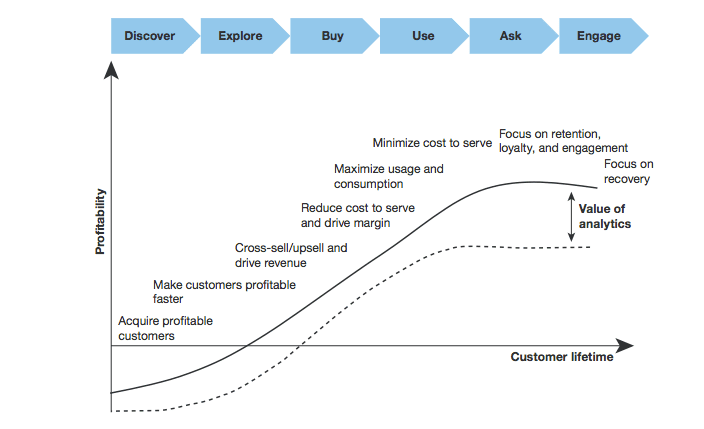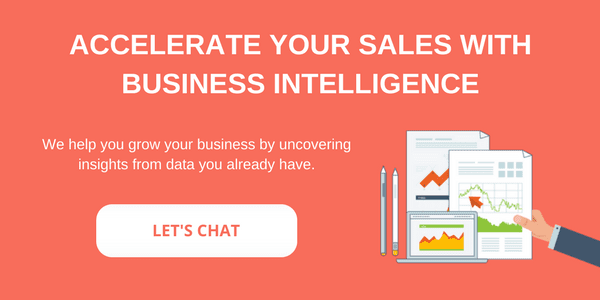Think of all your salespeople do for you. Your bottom line depends on them! They convert leads, nurture client relationships, and close the deals time and time again. That’s why you should do something nice for them in return – something nice that just so happens to be good for you and your company, too. Give them the best tool you could give your sales team: true business intelligence.
Sales is a high-pressure job driven by performance metrics. But, as much as businesses want to see their salespeople succeed, some businesses struggle to provide the right tools that can turn their sales people into real rock stars. In turn, their salespeople struggle. That usually means growth is dampened, too – and you may not even realize it, because you don’t have the analytics to show you what’s possible.
There is no shortage of technology designed for sales professionals. There are scheduling apps, CRM and list management programs, and sales training sessions galore! But, there is one tool that beats out all the others, and that is a really good business intelligence tool.
Business intelligence (BI) is fueled by data – and lots of it. A good BI tool analyzes and presents tons of data in easy-to-understand charts and reports. It turns assumptions into facts and can significantly increase efficiency.
Knowledge is power and data empowers. Here are 4 key outcomes that business intelligence can enable your sales team to achieve.
1. Track performance with rich metrics
Salespeople are inherently driven by numbers. Business intelligence gives you data that goes beyond what a spreadsheet can provide. A spreadsheet is just numbers. The right BI tool gives you the numbers in a way that makes more sense, so you see relationships between the numbers and can apply them in more practical ways to day-to-day operations and strategy.
With the right data, your sales team shouldn’t have to guess anymore. They would know exactly which customers to go after, what price points to offer, what products and services your customers need – and when those products can be delivered. The kinds of metrics a business intelligence tool can offer don’t just tell you how many widgets you sold in a month. A tool like this tells you who bought the widgets, how likely they are to purchase from you again, and whether or not you should contact them again in a month. In other words, it gives you answers that you can make real decisions with and even predict future sales – not just empty numbers of how you’ve done and where you’ve been in the past months or year.
A 30,000-foot view of the company sales goals is great, but the magic happens when your salespeople have access to more granular data so they can dive into the sales process to really understand what works and what doesn’t.
2. Increase the quality of sales leads
It’s easy to throw up a lead page on your website to capture leads from interested visitors, but all those leads will not be equal. Just because you’ve collected an email in exchange for information does not mean that lead is ready to buy (or will ever buy). It’s a waste of time and resources to send your salespeople after every person who gives you an email address. There has to be a sales funnel where leads are nurtured and qualified before you ask for the sell.
With the right business intelligence and data, you can track behaviors and qualify leads before a salesperson gets involved. You can assign probability percentages based on past sales performance, so sales reps can prioritize their time on each type of prospect.
This data can also be used to help your marketing department refine their campaigns so your salespeople get quality sales leads. With data, you don’t have to hope a list of leads will result in at least one sale. You can use predictive analytics to see which leads are actually viable. That’s the difference between regular data and what a business intelligence tool can provide.
3. Get to know your customers and clients better
In addition to building profiles and qualifying leads, business intelligence can give you valuable insights into your current customers. You can gather everything from demographics to past behaviors and then use that information to predict future events.
Business intelligence can also make the customer development process easier. Building relationships is often time-consuming but very important. This step of the sales cycle can often be made more productive and sometimes be sped up if you have the right tools. With business intelligence, you can apply analytics across the life cycle of each customer to identify opportunities where you can provide more value. This helps increase the customer’s lifetime value and can reduce the cost of acquisition.
Here’s an excellent diagram of how that works found in “How Analytics Drives Customer Life-Cycle Management,” a study produced by Forrester Research Inc. in 2015.

4. Spot trends more easily
By diving into the data, you can learn more about your customers, the leads you’re getting, and your sales process. Let’s go back to that 30,000-foot view. With business intelligence, you can take a step back and spot trends that will help you plan for future growth. An example we gave earlier is spotting trends in your leads so you can pinpoint exactly which type of lead is more likely to convert. Other examples would be territory planning, engagement strategies, and marketing trends. Being able to spot trends and track performance will help you create sales strategies backed by data – not by hunches and feelings.
The takeaway
Think of what your sales team could accomplish with a real BI tool. Not only will it track their performance – it could give them actual facts and trends to base future sales strategies on. These are the kinds of invaluable insights (not just numbers) that can streamline the sales process and lower the cost of acquiring leads, converting them and closing them. A tool like this could easily pay for itself in the time it saves, since your sales team will be able to act with confident precision instead of guessing whom to go after each day.
Are you curious about what kind of business intelligence tool might give your company the answers you’re looking for? Interested to know what kind of information and insights into your own organization and sales process you might find? Schedule a call with us and let’s discuss!







